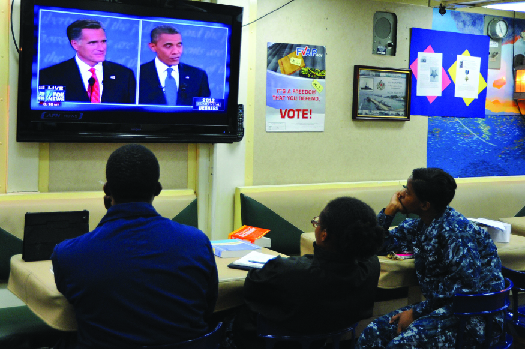| << Chapter < Page | Chapter >> Page > |
The
general election campaign period occurs between mid-August and early November. These elections are simpler than primaries and conventions, because there are only two major party candidates and a few minor party candidates. About 50 percent of voters will make their decisions based on party membership, so the candidates will focus on winning over independent voters and visiting states where the election is close.
Debates are an important element of the general election season, allowing voters to see candidates answer questions on policy and prior decisions. While most voters think only of presidential debates, the general election season sees many debates. In a number of states, candidates for governor are expected to participate in televised debates, as are candidates running for the U.S. Senate. Debates not only give voters a chance to hear answers, but also to see how candidates hold up under stress. Because television and the Internet make it possible to stream footage to a wide audience, modern campaign managers understand the importance of a debate ( [link] ).

In 1960, the first televised presidential debate showed that answering questions well is not the only way to impress voters. Senator John F. Kennedy, the Democratic nominee, and Vice President Richard Nixon, the Republican nominee, prepared in slightly different ways for their first of four debates. Although both studied answers to possible questions, Kennedy also worked on the delivery of his answers, including accent, tone, facial displays, and body movements, as well as overall appearance. Nixon, however, was ill in the days before the debate and appeared sweaty and gaunt. He also chose not to wear makeup, a decision that left his pale, unshaven face vulnerable.
Debating an opponent in front of sixty million television voters is intimidating. Most presidential candidates spend days, if not weeks, preparing. Newspapers and cable news programs proclaim winners and losers, and debates can change the tide of a campaign. Yet, Paul Begala , a strategist with Bill Clinton’s 1992 campaign, saw debates differently.
In one of his columns for CNN, Begala recommends that candidates relax and have a little fun. Debates are relatively easy, he says, more like a scripted program than an interview that puts candidates on the spot. They can memorize answers and deliver them convincingly, making sure they hit their mark. Second, a candidate needs a clear message explaining why the voters should pick him or her. Is he or she a needed change? Or the only experienced candidate? If the candidate’s debate answers reinforce this message, the voters will remember. Third, candidates should be humorous, witty, and comfortable with their knowledge. Trying to be too formal or cramming information at the last minute will cause the candidate to be awkward or get overwhelmed. Finally, a candidate is always on camera. Making faces, sighing at an opponent, or simply making a mistake gives the media something to discuss and can cause a loss. In essence, Begala argues that if candidates wish to do well, preparation and confidence are key factors.
Is Begala’s advice good? Why or why not? What positives or negatives would make a candidate’s debate performance stand out for you as a voter?

Notification Switch
Would you like to follow the 'American government' conversation and receive update notifications?